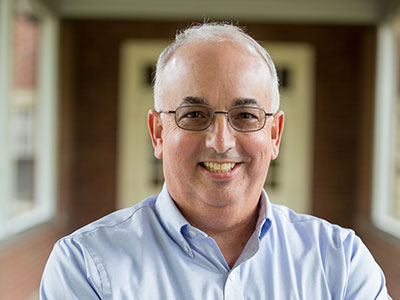When aerospace engineer Dr. James Downey changed the focus of his career from all-things-physics to institutional effectiveness, he didn’t leave his interest in science behind. That fact will be aptly illustrated this year in Pittsburgh Seminary’s Continuing Education program, for which Jim has coordinated a Community and Conversations series titled “Science!” And in January-February 2018 Jim will add another role to his PTS position as vice president for planning and institutional effectiveness—that of instructor of the online class “Big Bang and Cosmic Creation: God, the Universe, and Everything.”
“The class will begin with a brief history of the conflict between faith and science that grew in the mid-20th century and continues to divide segments of the church,” notes Jim. “Then we’ll turn to early universe cosmology, starting with the Big Bang, and learn how science can actually be reconciled with faith and provide insights into God’s creation.” Jim anticipates the course will be beneficial to pastors and other ministry leaders who want to engage these topics at a basic level in the communities they serve. “The only requirement is a curiosity about faith and science!” he says.
The curious will have an even earlier chance to whet their faith-and-science appetite by attending Continuing Education’s six-part “Science!” series, generously funded by the American Association for the Advancement of Science. Jim will conduct the opening session, “The Wonder of Science,” Oct. 18. “Science and faith have something in common—the capacity to invoke a sense of wonder by engaging the world around us!” Jim enthuses. “So I hope a lot of people will join us to hear from scientists working in fascinating areas that affect our daily lives.”
Those scientists include Arthur Kosowsky, professor of physics and astronomy at the University of Pittsburgh, who will speak on “Our Model of the Universe.” He notes, “The last 20 years have brought, for the first time in human history, a precise understanding of the properties and evolution of our universe over almost all of its history. I will explain what we know and what we don’t know about our universe from a scientific perspective.”
The other speakers and topics include the University of Pittsburgh’s Michael Dickey, associate professor of communication science and disorders, on “The Science of Language”; Google software engineer Tim Howe on “Teaching a Machine to Learn”; the Carnegie Museum of Natural History’s Stephen J. Tonsor, director of science and research (and also associate professor of biological sciences at the University of Pittsburgh), on “Creation, Intelligent Design, and the Evolutionary Process”; and the University of Pittsburgh’s Lisa S. Parker, professor of human genetics and director of the Center for Bioethics and Health Law, on “Genetic Engineering: Hubris, Humans’ Destiny, or Ethical Obligation?”
An alum and former professor of physics and engineering at Grove City College and a former professor of science and technology at the United States Army War College, Jim certainly knows what it means to teach science well. And though he’s retired as a colonel in the United States Air Force Reserve, he certainly hasn’t retired from his passion for science or from continuing to educate those around him in this faith-enriching field.

